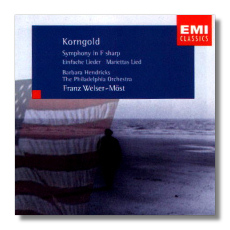
The Internet's Premier Classical Music Source
Related Links
- Korngold Reviews
- Latest Reviews
- More Reviews
-
By Composer
-
Collections
DVD & Blu-ray
Books
Concert Reviews
Articles/Interviews
Software
Audio
Search Amazon
Recommended Links
Site News
 CD Review
CD Review
Erich Wolfgang Korngold

Symphony
- Symphony in F# Major, Op. 40
- Sechs einfache Lieder (excerpts)
- Die tote Stadt - "Mariettas Lied"
Barbara Hendricks, soprano
Philadelphia Orchestra/Franz Welser-Möst
EMI 56169 63:00
Welser-Möst is one of the most interesting conductors today. His recordings reflect an interest in music not frequently found on disc. I recently reviewed and enjoyed his recording of Schmidt's 4th Symphony. This is another rare gem that has needed a new recording.
Korngold is primarily known as a composer of film music. It is less known that he was also a prodigy and composed much "formal classical music". This symphony is but one example. You can hear moments from some of the film scores while listening to this piece. It sounds a lot like Schmidt's 4th Symphony, more so than Mahler or Strauss, who are mentioned in the insert notes. Another work that comes to mind is Bernard Hermann's symphony. Korngold's symphony is, over-all, a somber work with a tremendously moving adagio. The scherzo is rambunctious but suddenly a wonderful, beautiful horn passage emerges that tells you where John Williams stole his music from for Star Wars. The Philadelphia Orchestra are in top form.
In fact, I could give this release an unqualified recommendation if it were not for one thing, the same symphony is on Varèse Sarabande conducted by Rudolf Kempe. That disc has no coupling, however, but the performance of the symphony is even darker and the sound is excellent. (I have not heard the Chandos release). Kempe's interpretation of the first movement is almost three minutes longer than Welser-Möst, but it is not at all slack. Kempe maintains a tension, the bass is deeper and more sinister. The rest of the movements are almost identical in timings. The problem with this EMI release, in comparison, is that it makes the symphony sound like the kind of symphony a film composer would write. It is not at all a bad interpretation, but I slightly prefer Kempe's.
The sound is also a factor. The Varèse Sarabande release has a deeper, more detailed sound. I have noticed of late that recordings of the Philadelphia Orchestra seem to have a thin veil over the sound. I made note of that when listening to Sawallisch's recording of Stokowski transcriptions and also in Janson's recording of Shostakovich's 10th Symphony with that orchestra. You can turn up the volume, but there isn't the transparency that the music needs for best effect. While this is not a major factor, I have to report the difference.
On the other hand, the EMI disc has the Six Simple Songs (Sechs einfache Lieder). These delightful songs are the product of his early musical output, written when he was in his twenties. I am not sure whether it is the music, the singer or a gestalt of the both, but I really enjoyed listening to these pieces. The subject matter in each one is simple: Snowdrop, Serenade (memories of love), Love Letters, Summer, Marietta's Song (about lost love, but hope in resurrection). They are sung in German, and I have generally found that language hard to appreciate in music. While I like the kind that Ute Lemper sings, most lied leaves me cold (even, gasp, Schubert). These, however, are a real treat to the ear. I'd recommend this disc just to enjoy Barbara Hendrick's singing of Korngold's lied.
The insert notes to the EMI disc are okay, a bit about the composer and the music. I find the notes in the Kempe CD, however, more helpful in getting a handle on the music.
The bottom line (in case you've skipped to this) is that this EMI disc is recommended. On the other hand, I would suggest you also check out the Kempe recording for an alternative view of the symphony. That Varèse Sarabande disc was produced under the supervision of Korngold's son, which may help explain why it sounds so good.
Copyright © 1997, Robert Stumpf II



















